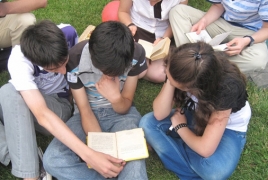
If you want to make sure that you understand this story as fully as possible, you might consider printing the article and reading it on paper. That is one of the findings of a recent study of research done on the differences between paper and screen reading, the Voice of America reports.
Virginia Clinton carried out the research examination. She is a professor of Education, Health and Behavior at the University of North Dakota. She found what she called a “small but significant” difference in reading text from screen versus paper.
Researchers have been investigating for years the ways in which screens affect the quality of a person’s reading. The magazine Scientific American reported that at least 100 studies have been published on the issue since the 1980s.
Until the early 1990s, most studies found that people read more slowly and with less accuracy on screens than on paper.
However, later studies show more mixed results. Some continued to report findings similar to those earlier studies. Others suggested technological improvements over the years had improved reading quality on screens.
Clinton’s aim was to bring together some of the most recent findings on reading performance, reading speed and a skill known as metacognition.
Clinton looked at 33 past studies that examined paper versus screen reading. All of the studies were done between 2008 and 2018. The studies collectively had 2,799 study subjects, including both children and adults. All were native English speakers and had usual reading skills for their age.
Clinton’s examination found that reading from paper generally led to better understanding and improved a person’s performance on tests connected to the reading material. And, she found no major differences in reading speed between the two. In other words, paper reading was found to be more efficient.
Such differences were notable only when the reading materials were expository texts-- or explanatory and based on fact. Clinton said she found no major difference when it came to narrative, fictional texts.
Clinton also found that paper readers usually have a higher recognition of how well they have understood a text than screen readers. This skill is called metacognition. The word “cognition” means the mental action of increasing knowledge and understanding. “Metacognition” simply means thinking about one’s own thinking.
Clinton and other researchers have found screen readers often believe they understand a text better than they really do. And, they are more likely than paper readers to overestimate how well they would do on a test of the materials they have read.

